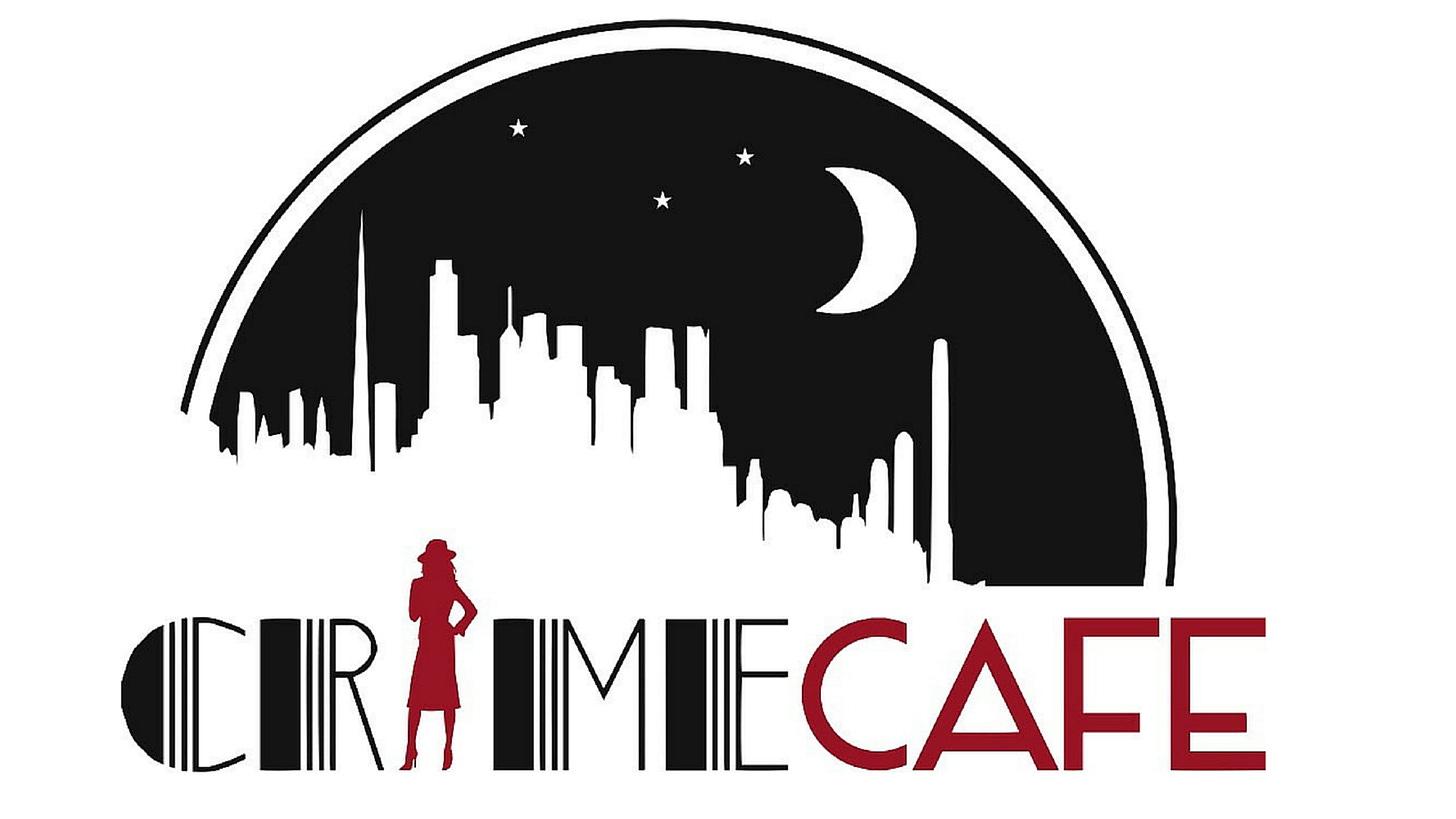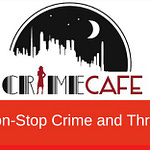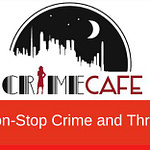Subscribe:
Apple Podcasts | Google Podcasts | Spotify | Stitcher | Blubrry | Email | TuneIn | RSS | More
Debbi Mack interviews crime writer Mark Edward Langley.
This is the Crime Cafe, your podcasting source of great crime, suspense and thriller writing. I’m your host Debbi Mack. Before I bring on my guest, I’ll just remind you that the Crime Cafe has two eBooks for sale: the nine book box set and the short story anthology. You can find the buy inks for both on my website, debbimack.com under the Crime Cafe link. You can also get a free copy of either book if you become a Patreon supporter. You’ll get that and much more if you support the podcast on Patreon, along with our eternal gratitude for doing so.
Check us out on Patreon: https://www.patreon.com/crimecafe
Please join my fundraising team, DMV Dystonia, to raise funds for research on this rare movement disorder. Remember to pick that team when signing up!
The full link is here: https://bit.ly/DMVDystonia
Debbi (00:54): But first, let me put in a good word for Blubrry podcasting.
I’m a Blubrry affiliate, but that’s not the only reason I’m telling you this. I’ve been using Blubrry Podcasting as my hosting service for my podcast for years and it’s one of the best decisions I ever made. They give great customer service, you’re in complete control of your own podcast, you can run it from your own website, and it just takes a lot of the work out of podcasting for me. I find for that reason that it’s a company that I can get behind 100% and say, “You should try this.” Try Blubrry. It doesn’t require a long-term contract, and it’s just a great company, period. It also has free technical support by email, video, and phone, so you can get a human being there. Isn’t that nice?
If you want to podcast, try out Blubrry. No long-term contract, excellent distribution, and great technical support, too, by email, video, and on the phone. I’ve included an affiliate link on this blog.
Here’s a link to a PDF copy of the interview.
Debbi: Hi, everyone. Our guest today began his love of reading as an employee with B. Dalton Booksellers. Remember them? I do, fondly. He’s the author of the Arthur Nakai Mystery Series which takes place in New Mexico, the only part of the Southwest I still haven’t really seen to my satisfaction. I want to go back someday.
Debbi: His second novel, Death Waits in the Dark, was a finalist in the American Book Fest Awards 2020 and won the Feathered Quill Award in 2021. His latest novel is When Silence Screams.
Debbi: I’m pleased to have with me, author Mark Edward Langley.
Debbi: Hi, Mark. It’s great to see you here.
Mark: Hi, good to be here.
Debbi: I’m glad you’re here. Thank you.
Mark: Happy to be here.
Debbi: Excellent. Good. First of all, I’ve got to say, I used to love B. Dalton Booksellers. What did you do there?
Mark: Oh, Lord. You’re going back to 1980, and my parents, my family, moved down there, but my dad got transferred, and it was just close by. I… “Well, I’ll get a job there,” and I ended up, for the time I was there, started out in the backroom, receiving the books, getting them all labeled and stickered and stuff, and putting them out. And then, got to be on the register and that kind of stuff. So, ended up stocking and work and that. And I loved being down there because it was right down the street from the Windmill Dinner Theater, and a lot of actors came through doing plays there, and a few of them actually stopped in the store to buy some stuff.
Debbi: Excellent.
Mark: I loved it. I loved it. But I got instilled in reading then. I was watching the Spenser for Hire series on television. And one of the ladies I worked with said, “If you love the show, you should read the books.” So I started reading the books and was hooked from thereon.
Debbi: Isn’t it interesting how things often start with television? I know that my love of mystery started with watching Honey West way back in the day.
Mark: Oh, boy.
Debbi: Now I’m going back.
I was watching the Spenser for Hire series on television. And one of the ladies I worked with said, “If you love the show, you should read the books.”
Mark: Yeah. Oh, boy, yeah. But yeah, it’s just funny how things happen like that. And then, I got into reading Robert Parker and then Mickey Spillane and John D. MacDonald, and just went from there, and I just started loving whatever I could get my hands on.
Debbi: All great stuff. Well, tell us about Arthur Nakai. He’s an interesting character, an
ex-marine, a former member of the Special Ice Unit, and a Native American. Correct?
Mark: Exactly. Yes.
I got into reading Robert Parker and then Mickey Spillane and John D. MacDonald, and just went from there, and I just started loving whatever I could get my hands on.
Debbi: How did you come up with this character? Not to mention his wife, who’s a news reporter. And I thought that was interesting. Please tell us more.
Mark: Oh, sure. I mean, I started thinking about developing… First, I took a two-week vacation out there and I traveled the route that’s in the book. So, whatever I saw along that way, I dictated into a tape recorder and came back and transposed it all down. Then started developing characters and backstories for the characters. And I stumbled across… I wanted to be different in a lot of ways than other writers that are out there writing about that, and not as far as the police goes or whatever it may be but I developed Arthur Nakai based on my love for R. Carlos Nakai, the Native American flute player. And at the time, one of my friends where I worked a million years ago, it seems like now, whose first name was Arthur. So, I liked the way that rang together. So, I used that, developed a character with that.
First, I took a two-week vacation out there and I traveled the route that’s in the book. So, whatever I saw along that way, I dictated into a tape recorder and came back and transposed it all down. Then started developing characters and backstories for the characters.
Mark: As far as his wife, Sharon, goes, I actually was texting back and forth in the mornings with one of the local reporters on the NBC Station here in Chicago, and I wanted to ask her some questions about what do you give up to have this life you have? I wanted to make her real and things that happen in their life, once you have that job, a lot of things you don’t get to do. You miss a lot of birthdays, anniversaries, and you’re always on the air doing something. So, she helped out a lot with that. And I developed that character and the other ones like Jake Bilagody, which is loosely based on my grandfather, a large barrel-chested man, with that. So, I kind of start molding these people into what I have now.
Debbi: I think it’s really interesting the way your travels inform your fiction writing.
I actually was texting back and forth in the mornings with one of the local reporters on the NBC Station here in Chicago, and I wanted to ask her some questions about what do you give up to have this life you have? I wanted to make her real and things that happen in their life, once you have that job, a lot of things you don’t get to do.
Mark: Oh, yeah. That was the whole plan to do that because you can’t just look online and find pictures and things, and do things, and do searches. You have to be there. And that’s what I found out a long time ago. I told Anne Hillerman once that her father helped me understand the importance of descriptive sentencing, to set surrounding and set place.
Mark: I think Robert Parker helped me develop the dialogue, conversations in books. So. I use those along with that. I had to be there. You have to smell it. You have to see it. You have to taste it. You have to feel the heat, feel the cold, in order to convey that to the reader in the book. And a lot of people who have read my books feel like they’re right there in the situation, in the area. I love that.
Debbi: That’s the effect you want. Absolutely.
Mark: Yeah.
You have to feel the heat, feel the cold, in order to convey that to the reader in the book. And a lot of people who have read my books feel like they’re right there in the situation, in the area. I love that.
Debbi: And I do have to say that I love the Southwest. It’s beautiful. The area is gorgeous. It’s such a great place to set a mystery in more ways than one.
Mark: Oh, yeah. I fell in love with that when I was in my preteens, and it just stuck with me when I went back for this Path of the Dead book to take the tour out there with that. Once I got into the area and was driving through the red landscape up through Utah’s, I was home. I mean, I just… That’s the way I feel about it. I would be no more worse for wear living out there. And that’s my plan if things go as well as I hope they will, to be able to take my wife and move out there so I’m closer to it. If I have areas in the book I need to go to, hop in the truck and go there, and get the firsthand information of that. Now I can be able to talk to people out there. I talked to several Navajo people my last trip out there and got their take on a lot of things. And it’s good to be able to have that afforded you right there, to just pick up and go, be where it needs to be, meet the people and talk to them, and I just get a wealth of information.
Debbi: Yes, absolutely. I was fascinated by the way you did research on the Navajo people while you were there. It seems that your research, in a way, it really started as a happy accident, kind of like you met people, they told you things, and you sort of took it from there. Is that about right?
Once I got into the area and was driving through the red landscape up through Utah’s, I was home. I mean, I just… That’s the way I feel about it.
Mark: Exactly. The funny thing was that what began that whole journey of meeting people was, I was creating a situation in the book, in Path of the Dead. I mean, Death Waits in the Dark. Sorry. Where I had this high school student and I wanted to make sure if he lived in this certain area, would he go to this high school? So, I found somebody online that I saw who lived in Farmington and could answer my question. So, I asked her about that, and she agreed to answer it. And she said, “Yeah.” And this, we got talking back and forth and became kind of Facebook friends. And then, she was actually the one, her name was Bettina. She was the one who got me involved in meeting some people out there when I went out there, and I got to learn a lot because one of them was Arnold Clifford. And you look at the man and he’s just a regular kind of guy, and baggy pants and shirt and stringy hair. But he was the foremost geologist and botanist of the area. He gives dissertations at universities, takes university students out in the field, and talks about everything, and shows them all that.
So, I found somebody online that I saw who lived in Farmington and could answer my question. So, I asked her about that, and she agreed to answer it. … we got talking back and forth and became kind of Facebook friends. … She was the one who got me involved in meeting some people out there when I went out there …
Mark: So, I spent a day with him and the best thing was… is recording him telling me everything about the certain areas that’s in the book. So, I learned a great deal, and I refer to him several times in the second and third book. I learned a lot and will continue to do that guy. I follow him on Facebook. I learned a lot more with that. He’ll answer questions, and we’ll go back and forth. So, meeting the people like that really just opened up a whole door out there of information and friendship.
Debbi: It makes a huge difference in terms of the quality of the fiction too, I think.
Mark: Right.
Debbi: Getting to know people, talking to them, and actually experiencing the place. Totally.
Mark: Exactly.
Debbi: Let’s see. Tell us a little bit about your latest book. What’s it about?
Mark: Well, I came upon the idea of When Silence Screams by being a part on Facebook, linking up with MMIW, which is Missing and Murdered Indigenous Women organization. And every day, it seemed like, a couple of years back, I was getting notifications and flyers every day of someone going missing. It could be once, twice, three times a day. So, I decided to look into that more. I went to their website and I saw all the flyers of all the girls and women that ended up missing or were found murdered or whatever. And it struck me that when I read in 2016 alone, 5,712 girls and women went missing on the reservations in the US and Canada, that I thought, you know, that number’s a number. Well, when you see all the flyers that put a face to that number, it becomes more meaningful, more scary, more and more palatable because it puts a face to the name, all the information about that person.
I came upon the idea of When Silence Screams by being a part on Facebook, linking up with MMIW, which is Missing and Murdered Indigenous Women organization. And every day, it seemed like, a couple of years back, I was getting notifications and flyers every day of someone going missing.
Mark: And I started watching videos of the interviews with the families that are trying to deal with a missing person, that they have a daughter or son or whatever. And it just struck me that no one ever hears about this. And like a character says in the book, “When it’s a nice white girl missing off the golf course, everybody hears about it. But you have 5,712 in one year alone, and it’s not broadcast, but in the local media?” I mean, so, I don’t want to beat people over the head with it, but I don’t do information dumps on things, but I think that I want to raise awareness and that this happens. It happens daily. And that’s one of the things the Navajo people like I spoke with is I’m dealing with situations they deal with on a daily basis. So, they like the fact that I’m writing about current events out there. I’m not just making up some whimsical story about things.
Debbi: Yes, that’s great. I mean, it’s great that you’re raising this issue, making people aware of it. It’s something that I never really thought about or knew till I read your book.
Debbi: Let’s see. Right now, you’re working on your fourth novel. Is that correct?
Mark: I was doing that today. Yes, I was working on that. I’m some chapters into that. I got an idea for the fifth book. I titled that sort of the first two chapters of that one. And then, I’m also in the middle of, while doing those things, focusing on book four, for sure. But I am creating a new series in a different part of New Mexico out there with a different character and different people in that one.
Debbi: Ooh! Can you give us a hint as to what type of protagonist it is?
Mark: Well, I wanted it to be different. Again, like anybody else out there, it wasn’t going to be a Walt Longmire sheriff or a CJ Box, Joe Pickett, you know, person. So, I did a little research and found out what job out there would contain the aspects I would need to create this character. And I researched and researched, and I came upon the New Mexico Livestock Board and contacted the Deputy Director there. I had a nice long Zoom conversation with him, and he answered several questions. I emailed back and forth and got more information.
I came upon the New Mexico Livestock Board and contacted the Deputy Director there. I had a nice long Zoom conversation with him, and he answered several questions. I emailed back and forth and got more information.
Mark: So, the new character’s going to be part of that. And he’ll be… Since his previous life, what it was a New Mexico State Police Officer, there’ll be then able to work with them as well, too. So, not just stick to his district, but go and do different things.
Mark: So, it’s developing really well with that. And I’m hoping that that would be just as good because right now what I’ve got so far, I got closed case files from the Livestock Board concerning certain things. I’ve mixed a few of them together to form one storyline and hook things together. So, that’s good. I’m going to be developing that. I think it’s going to be a really good character. It’s going to be a character people are going to like too because it’s different than the others. And it has a whole new take on things out there. Just like with Arthur Nakai, and so forth, I’ve got contacts with the Phoenix Police, Santa Fe Police, Albuquerque Police.
Mark: I just got 100-page document here from University of New Mexico and their Office of Medical Investigator to go through because one of my characters in Arthur’s books is the Medical Examiner Investigator, the SDMI. So, I want to make that more real. And those case files there are to help me do that.
Debbi: I am impressed with the amount of research you do, and how much it grounds your stories.
Mark: I do an awful lot, yeah.
Debbi: I was going to say, I have a tendency to do a lot of research myself. According to your website, you have a total of nine books in the series in the works. Does that mean you have nine ideas at this point for your Arthur Nakai series? Outlines?
Mark: At that point, yeah.
Debbi: Certainly not fully written books.
Mark: But first, the first three-year are out. So, there are six, possibly seven more. I’ve already titled them. I’ve already outlined them, so I know where I’m going when I get there. But it’s amazing, and you might know as well, too, when you’re writing something, whether it be dialogue or whatever, but it’s definitely dialogue with me. If I start writing a conversation, I know where I want it to go. But then, the personalities of the characters leach into the whole thing and take me to a different place. So, I still get to where I’m going, but it fills out and it rounds out more and becomes more of a believable dialogue because they take over. They take over and their own ideas come through, their own wants and needs are there. So, I think it makes for a much better story to read. I’ve heard that from a lot of my readers that have emailed me and then put things online. They love the characters. They’re falling in love with the characters. They want to see them succeed. They’re cheering for them. They’re crying with them. So, I’m glad I can reach someone like that, and they get what I get.
Debbi: That’s excellent. That’s exactly what you want.
Mark: Yeah.
Debbi: Let’s see. I was going to ask you something about the… Oh, yeah. The series. So, do you have a plan in terms of how it’s going to end?
Mark: At this moment, I don’t think about how it’s going to end. I just keep developing storylines and titles for the books to come. And then, I’ve already researched for the fifth book. That’s in my file cabinet behind me here. It’s about an inch and a half thick so far of that.
Mark: But I like to go through and just roll with the flow and kind of see how it goes and where the thing takes me because I have ideas, I have situations, and they may pan out, they may not. The title will probably stay but the storyline may change. I’ve been told I do things backward. I create a title first and fill a story out around it. But it’s kind of like how, When Silence Screams came about, and reading those things, I decided to have that line kind of spoken by the Field Deputy Medical Examiner explaining why she does the job she does is because no one hears these girls when they’re alive but she’s the only one to hear their silent scream. To say, “Look what happened to me. Look what happened. Find it out. Figure it out. Find who did this.” So, that’s kind of where that comes from. And all the titles that I think of has a little figure around that, of what the story is going to be. And then, I do research and find out things that will complement that storyline.
I’ve been told I do things backward. I create a title first and fill a story out around it.
Debbi: Yeah. I usually ask authors what writers inspired them. And in your case, I know there were some obvious suspects like Tony Hillerman and Craig Johnson.
Mark: Right. Exactly. Yeah. I mean—
Debbi: What authors—
Mark: … Tony…
Debbi: Yeah. Go ahead.
Mark: Oh, Tony, for sure. One of the books I picked up after a Robert Parker Spencer series was some of Tony’s books, and I started reading those. So, Robert B. Parker, Tony Hillerman, John D. MacDonald, Craig, lately. I met Craig a long time ago and we message back and forth and email sometimes and get things together. But it’s one of those things where reading them… I told Anne about her dad. I says, “You know, your father taught me about the landscape.” And John D. MacDonald taught me about setting up things with the writing in general. Parker taught me about dialogue. Mickey Spillane taught me about action in a novel. And Hemingway, I think, taught me heart. I read a lot of things of all those authors, so I have… I showed Anne, too, I have the complete works of her dad in hardcover first edition.
I told Anne [Hillerman] about her dad. I says, “You know, your father taught me about the landscape.” And John D. MacDonald taught me about setting up things with the writing in general. Parker taught me about dialogue. Mickey Spillane taught me about action in a novel. And Hemingway, I think, taught me heart.
Mark: I have those. I have all of Craig’s and they’re all signed. I have all of Robert B. Parker’s. So, I have… I read them. I haven’t gotten back to them now that I’m a writer, But I read them whenever I can and I get a short time to do so.
Mark: But, yeah, they all affected me. I feel like I learned from the masters by reading and absorbing what they were doing.
Debbi: Yeah.
Mark: Robert Parker had his whole thing was Raymond Chandler. I imagine he just took all that. And that’s how Spenser came about. His dissertation in college was about all that. And they grow. You can see these writers, Tony and Robert, when their first novels came out, as they grew throughout the series, as a writer, you could tell. And things just evolved and got much better, and that’s going to happen to me and everybody else that writes. The more you do it, the more it evolves and gets better.
Debbi: That’s great. That leads right into my next question, actually. I was going to ask you what advice you would give to aspiring novelists.
Mark: Oh, boy. I think number one is, never give up on yourself. Never let somebody else tell you you can’t do that because your dream isn’t their dream, and they have no reason or know how that affects you. So, always, always go for the best. Always do it. Reach for that gold ring because it could be out there. You never know. But you don’t know unless you try.
Mark: Study as much as you can. Research, as you and I know, as much as you can about things because none of us know everything. And the more we research… I learned about things I never thought about learning about in my life before doing this. And it’s just an incredible amount of knowledge let’s you evolve.
Debbi: Absolutely.
Mark: So, the more you can do that, the more you will find out about that. And just never give up. Never, ever give up.
Debbi: That’s so true. And we learn so much from each other. Writers do. I mean, like you said—
Mark: Exactly.
Debbi: … Robert Parker started with Raymond Chandler, essentially—
Mark: Everybody—
Debbi: … recreating him. And we all copy from each other to an extent. It’s like—
Mark: Oh, yeah.
Debbi: … part of the whole ecosystem, if you will, of writing.
Mark: That’s right. It’s like Milton Berle say he stole from everybody. You know what I mean? So, you read, you pick up, you learn things, and it formulates in your mind what you want to do and how you want to say it. You’ll say it differently. But everybody learns from predecessors. So, that’s just-
Debbi: Absolutely.
Mark: … That’s the way I feel it is.
Debbi: It’s true. It’s absolutely true. Is there anything else you’d like to add before we finish up?
Mark: Oh, just even anybody who wants to, can go to my website, markedwardlangley.com. It’s markrdwardlangly.com, one word, read about the books. All three of them are on there. You can buy them on there. You can go to any of my social media from there. Click on the icons and go to that. Learn more about the books and watch the book trailers, and see other… listen to past interviews. And there’s a whole raft, and then, don’t forget they need to go on there and join Members Only because, when you join Members Only, you will get monthly emails of things happening in my life and with the books and so forth. And occasionally, occasionally, I put in there excerpts of the new book I’m working on, so you’ll be able to catch a glimpse of what’s coming ahead.
Debbi: Fantastic. Well, thank you so much for being here today, Mark. I really, really appreciate it.
Mark: Fantastic. I love it, being here, too. Thank you very much for having me.
Debbi: Sure thing. My pleasure.
Debbi: And I would also like to thank my Patreon supporters, Ken MacClune and S. Koren. I’m putting together, very slowly, season-by-season episode guides to all the interviews that I have done on the Crime Cafe, which will be available to patrons. So, check this out on Patreon. The Crime Cafe box set and anthology come with the lowest tier contribution.
Debbi: So, our next scheduled guest will be Rea Frey. I’ll be seeing you in two weeks then. And happy reading.
*****
Don’t forget. We’re on Patreon. Please check us out there!

















Share this post